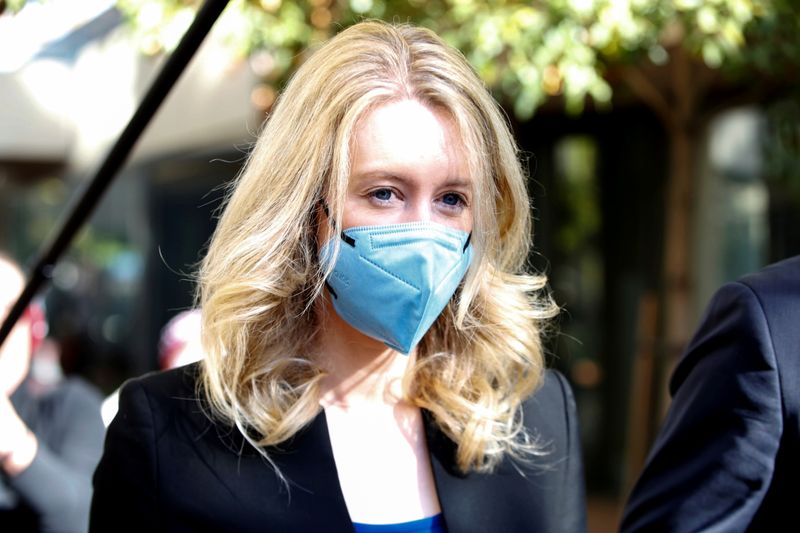
© Reuters. FILE PHOTO: Theranos founder Elizabeth Holmes leaves after attending her fraud trial at federal court in San Jose, California, U.S. November 22, 2021. REUTERS/Brittany Hosea-Small/File Photo
By Jody Godoy
SAN JOSE, Calif. (Reuters) -A prosecutor cross-examined Theranos founder Elizabeth Holmes on Tuesday about her relationship with former romantic and business partner Ramesh “Sunny” Balwani, in an apparent attempt to counter Holmes’ claims that he had been abusive.
Holmes, 37, testified on Monday that the relationship had a pervasive impact on her life during the time when prosecutors say she committed fraud.
Prosecutors say Holmes lied about the effectiveness of the technology at the now-defunct startup, claiming it could run diagnostic tests more quickly and accurately than traditional lab testing.
The former Silicon Valley executive has pleaded not guilty to nine counts of wire fraud and two counts of conspiracy.
Prosecutor Robert Leach on Tuesday showed Holmes texts between her and Balwani that he said showed them expressing love for each other, and had her read aloud the exchanges.
“I prayed from the bottom of my heart for you,” Balwani wrote in one exchange in 2015, which Holmes read, appearing to brush away a tear.
Leach also walked Holmes through text exchanges where Balwani, who was Theranos’ chief operating officer, expressed opinions about problems at the company. Holmes agreed that Balwani had not hidden his views from her.
Holmes testified last week that Balwani was in charge of certain aspects of the company, including financial projections that were shared with investors.
She said on Monday that she did not question him as she should have, because he had taught her “everything I thought I knew about business.”
In court filings, Balwani, 56, has “categorically” denied the abuse allegations, calling them “false and inflammatory.” An attorney for Balwani did not reply to a request for comment on Monday.
Balwani, who is also charged with fraud and will stand trial separately, has pleaded not guilty.
Once valued at $9 billion, Theranos vaulted Holmes to Silicon Valley stardom. The company collapsed after the Wall Street Journal published a series of articles starting in 2015 that suggested its devices were flawed and inaccurate. She was indicted in 2018.
Earlier on Tuesday, Leach questioned Holmes about actions Theranos had taken in response to then-Wall Street Journal reporter John Carreyrou’s news stories about Theranos’ technology. Holmes said that the company’s response to his reporting was a “disaster” and admitted trying to quash it.
Carreyrou, who was in the courtroom on Tuesday, authored “Bad Blood,” which chronicles the rise of the company that Holmes started at age 19 and describes retaliation against former employees after they raised concerns about Theranos devices.
Holmes on Tuesday denied trying to retaliate against two of those employees. But she admitted that concerns expressed by former Theranos lab employee Erika Cheung, who was a witness for the prosecution, were later validated by a regulator’s report on Theranos’ operations.
“I sure as hell wish we had treated her differently and listened to her,” she said of Cheung.
Source: Investing.com




























